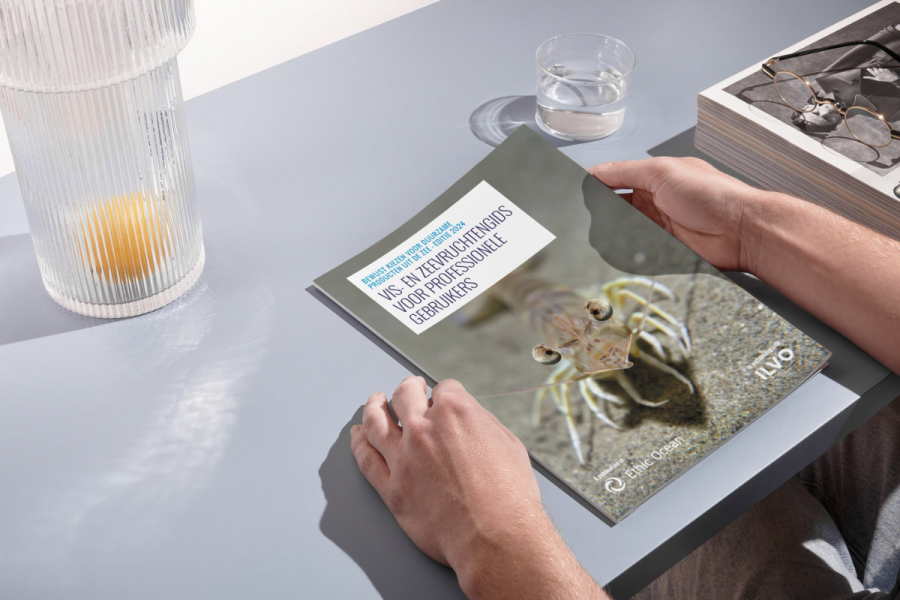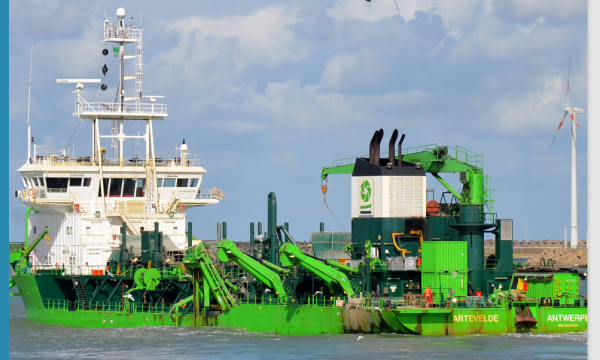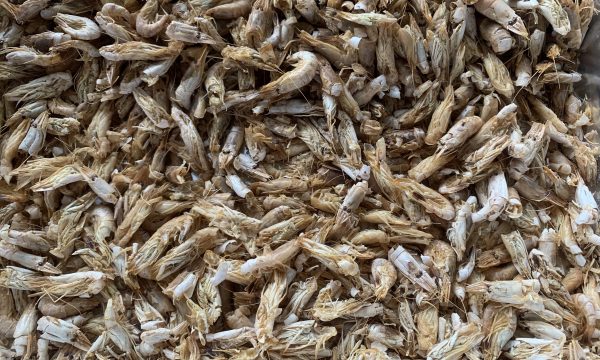Press release Sustainable Fish and Seafood Guide

The Ethic Ocean Species Guide is now available in Dutch
Just released: ‘Vis- en Zeevruchtengids – voor professionele gebruikers’, the Dutch-language edition of the Ethic Ocean Species Guide. This is the fourth Dutch edition of the popular guidebook.
Professional users, such as restaurateurs, hotel schools, fishmongers, retailers, suppliers, shipowners, fishermen and fish farmers, use this guide as their "bible”. It answers questions such as: How sustainable are specific fish stocks? What are the recommended minimum reproduction lengths? What are the evolutions in the health of the marine ecosystem? Based on scientific data and purchasing recommendations, this guide helps fish and seafood buyers choose sustainable products.
Concerned consumers can also refer to it. The Dutch-language version is now available at no cost at www.zeevruchtengids.org
Gilles Boeuf (Ethic Ocean): ‘The annual publication of this work is a long-awaited and valuable moment. The French version, “Le Guide des espèces à l’usage des professionnels” is meticulously updated each year. It is based not on opinion but on rigorous scientific data published and summarized by the Ethic Ocean team.’
Jade Maes (ILVO): 'This guide is important because it helps all links in the chain to make more conscious choices. By providing information on fish stocks and fishing methods, the guide can contribute to more sustainable fishing and support the recovery of vulnerable species.'
Nancy Fockedey (VLIZ): ‘The guide covers more than the fish and seafood landed by Belgian fisheries, as those represent less than 10% of what we consume. All imported fish from near and far are included. The previous Dutch-language guide dates back to 2018. Many people have been waiting for updated, comprehensible data on sustainability aspects so they could make better choices when buying fish and seafood.'
A true reference work on the sustainability of fisheries and aquaculture products
The Dutch-language ‘Vis- en Zeevruchtengids – voor professionele gebruikers’ is well-known in the wider fisheries sector. Now it contains more information than ever on the sustainability of the most consumed fish and seafood species in Belgium and France. The quantity as well as the quality of data generated for scientific research and fisheries management have increased greatly in recent years. These data lead to better assessment of fish stocks as well as better purchasing and consumption advice.
Data contributors are Ifremer (French National Institute for Ocean Science and Technology), ICES (International Council for the Exploration of the Sea), FAO (Food and Agriculture Organization of the United Nations), the European Commission and regional and international fisheries and fisheries management organizations.
The compiled scientific data, together with information on the fishing method and minimum reproduction size, form the basis for the buying recommendations. Are you wondering about buying fish, crustaceans, mollusks, echinoderms or algae? This guide contains all the details you need to determine the conditions under which you can either confidently buy or avoid a certain species.
The advice is different for farmed species. Because aquaculture practices vary from farm to farm, the researchers recommend checking with the supplier about the exact growing conditions and/or choosing labeled products.

Together toward a more sustainable fishery
This guide helps fishing, trade and hospitality professionals to make sustainable choices and to communicate transparently with their customers.
Jade Maes (ILVO): 'This guide helps all links in the chain (fisherman, chef, consumer, policy maker) to make more conscious choices. By providing transparent and science-based information about fish stocks and fishing methods, the guide can contribute to more sustainable fishing and support the recovery of vulnerable species.'
In Belgium, ILVO (Flanders Research Institute for Agriculture, Fisheries and Food) is responsible for collecting this data. ICES receives relevant data from ILVO and international institutes and uses this to formulate recommendations for fish quotas. Policy makers then decide the final quotas. The better the data, the more those decisions are based on scientific observations. All of this information is accessible to the sector, thus increasing the transparency of the fish quota decision-making process.
The guide is aimed at professional users but consumers can also find all the information online.
A first for ILVO
Since 2008, the French NGO Ethic Ocean (initiator and author of the guide) has published an annual update based on the latest available scientific data. Starting in 2014, the Flanders Marine Institute (VLIZ), in collaboration with ILVO, edited the first of three translated and adapted versions for the Belgian sector. Now for the first time in this fourth edition, ILVO has taken over Belgian editorship with support from VLIZ. Both institutes share ownership of the website www.zeevruchtengids.org.
The PDF version is available at www.zeevruchtengids.org. The website is now being updated to reflect all of the information from the guide.
Fihs and seafood guide 2024
Dutch-language guide available at www.zeevruchtengids.org.
Printed copies available upon request.
Website (French-language): www.guidedesespeces.org


For more information, comments or contributions
Contact ILVO's Marine Living Lab at marienlivinglab@ilvo.vlaanderen.be.
Ethic Ocean is een milieuorganisatie die zich inzet voor het behoud van de oceaan en mariene hulpbronnen. De organisatie werkt samen met alle stakeholders in de visserij- en aquacultuursector (vissers, viskwekers, visverwerkers, leveranciers, retail, vishandels, chef-koks en restauranthouders) om de implementatie van duurzame praktijken te initiëren en te ondersteunen.
Ethic Ocean - www.ethic-ocean.org - contact@ethic-ocean.org

